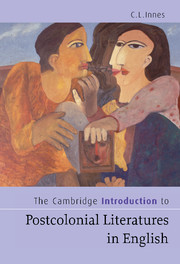Book contents
- Frontmatter
- Contents
- Preface
- Chapter 1 Introduction: situating the postcolonial
- Chapter 2 Postcolonial issues in performance
- Chapter 3 Alternative histories and writing back
- Chapter 4 Authorizing the self: postcolonial autobiographical writing
- Chapter 5 Situating the self: landscape and place
- Chapter 6 Appropriating the word: language and voice
- Chapter 7 Narrating the nation: form and genre
- Chapter 8 Rewriting her story: nation and gender
- Chapter 9 Rewriting the nation: acknowledging economic and cultural diversity
- Chapter 10 Transnational and black British writing: colonizing in reverse
- Chapter 11 Citizens of the world: reading postcolonial literature
- Notes
- Glossary of terms used (compiled by Kaori Nagai)
- Biographies of selected postcolonial writers (compiled by Kaori Nagai)
- Brief colonial histories: Australia, the Caribbean, East Africa, India and Pakistan, Ireland, West Africa (compiled by Kaori Nagai)
- Select bibliography
- Index
Chapter 9 - Rewriting the nation: acknowledging economic and cultural diversity
Published online by Cambridge University Press: 05 June 2012
- Frontmatter
- Contents
- Preface
- Chapter 1 Introduction: situating the postcolonial
- Chapter 2 Postcolonial issues in performance
- Chapter 3 Alternative histories and writing back
- Chapter 4 Authorizing the self: postcolonial autobiographical writing
- Chapter 5 Situating the self: landscape and place
- Chapter 6 Appropriating the word: language and voice
- Chapter 7 Narrating the nation: form and genre
- Chapter 8 Rewriting her story: nation and gender
- Chapter 9 Rewriting the nation: acknowledging economic and cultural diversity
- Chapter 10 Transnational and black British writing: colonizing in reverse
- Chapter 11 Citizens of the world: reading postcolonial literature
- Notes
- Glossary of terms used (compiled by Kaori Nagai)
- Biographies of selected postcolonial writers (compiled by Kaori Nagai)
- Brief colonial histories: Australia, the Caribbean, East Africa, India and Pakistan, Ireland, West Africa (compiled by Kaori Nagai)
- Select bibliography
- Index
Summary
Early nationalist and anticolonial authors often countered essentialist depictions of the colonized peoples with rather monolithic portrayals of their communities and cultures, deploying what may have been a necessary ‘strategic essentialism’, as Gayatri Chakravorty Spivak suggests in her essay ‘Can the Subaltern Speak?’ As Frantz Fanon remarks with regard to African writers, and specifically the négritude movement, the colonial defamation of the ‘Negro’, of Africans as a ‘race’, does not make discriminations between Angolans and Nigerians – ‘colonialism's condemnation is continental in scope’. In response, the culture which is affirmed by writers from countries such as Ghana, Kenya or Senegal, or from the African diaspora, is often ‘African Culture’, rather than a specific national or regional culture, and it is defined in racial terms, as we have seen in the brief discussion of négritude in chapter 1. We have also seen how later anglophone writers expressed their scepticism of the négritude school of writing and its emphasis on a glorious precolonial past. Nevertheless, many would now agree with Fanon that this recovery and affirmation of African achievements in the past was a historical necessity. But in Fanon's view, ‘[t]his historical necessity in which the men of African culture find themselves to racialize their claims and to speak more of African culture than of national culture will tend to lead them up a blind alley’.
- Type
- Chapter
- Information
- Publisher: Cambridge University PressPrint publication year: 2007

